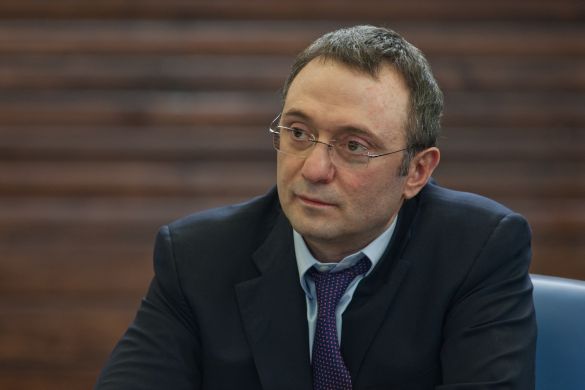
Kremlin Pushes Dagestani Billionaires to Invest in Dagestan
Kremlin Pushes Dagestani Billionaires to Invest in Dagestan
The return of controversial billionaire Suleiman Kerimov to Dagestan was this month’s big news in the republic. International Airport Makhachkala, a company affiliated with Kerimov, acquired a majority stake in the Makhachkala airport for $9 million and is expected to finalize its acquisition later. The price paid by businesses close to Kerimov is considered purely nominal, but the billionaire is expected to invest over $86 million in rebuilding the ailing airport’s facilities. According to experts, the challenge for Kerimov is to increase the turnover of passengers from 500,000 in 2013 to 1 million in order to start making a profit. Kerimov is also expected to invest in the aircraft fleet (Novoe Delo, June 16).
Such major investments in transportation facilities will require more investments in other areas of Dagestan’s economy and, possibly, loosening visa controls to make it easier for foreigners to travel to the republic.
The 48-year-old Kerimov was worth $6.8 billion as of June 25, according to Forbes (Forbes, June 25). He is an ethnic Lezgin from southern Dagestan’s Derbent. Lezgins are one of Dagestan’s major ethnic groups, but in terms of political power they lag behind the other two largest ethnic groups, the Avars and Dargins, which intermittently hold the leadership in the republic. Kerimov experienced a major setback in 2013, when President Alyaksandr Lukashenko of Belarus attacked his assets in the country and threatened to arrest him (Kommersant, May 21).
To date, Kerimov’s attempts to invest in Dagestan have had little success. Kerimov first attempted to come to the republic in 2007, when Mukhu Aliev was the president of Dagestan. Aliev eventually chose other businessmen over Kerimov, but when Magomedsalam Magomedov came to power in 2010, Kerimov’s infiltration of the Dagestani business world rapidly expanded. The billionaire built a glassworks factory near Makhachkala and promised to build more factories and finance the development of a new city south of Makhachkala. However, the Dagestani leadership changed again when Ramazan Abdulatipov came to power at the start of 2013, and Kerimov’s plans did not come to fruition (Novoe Delo, June 16).
It seems counterintuitive for Dagestani leaders to oppose investment by their compatriots, given the lack of investment in the republic, its high unemployment rate and other economic troubles. However, the reluctance of Dagestani leaders to allow Kerimov to come to the republic can be understood from the position of power politics. If the head of Dagestan allowed the billionaire to make large investments in the republic, given the tight connection between political power and the economy, the republic’s political leadership would have to share power with such a large investor.
Soon after Abdulatipov took over as leader of Dagestan, Kerimov was displaced as the major investor in the republic by Ziyavudin Magomedov, the main owner of the private investment company Summa Group. The 45-year-old Magomedov is worth $1.1 billion, and his conglomerate invests in port logistics, engineering, construction, telecommunications, and oil and gas (Forbes, June 22). Magomedov is an ethnic Avar and was close to Akhmed Bilalov, another Avar businessman who suffered Vladimir Putin’s ire in February 2013 and later had to flee Russia.
Ethnicity appears to have played an important role in the relationship between the Dagestani authorities and large businesses. In particular, Suleiman Kerimov, an ethnic Lezgin, was most welcome in the republic at the time when a member of another ethnic minority, Magomedsalam Magomedov, an ethnic Dargin, was in power. Suleimanov was evidently less welcome in the republic when members of Dagestan’s largest ethnic group, the Avars, were in power. According to the newspaper Kommerstant, the Kremlin had a direct influence on who would invest in Dagestan. The decision to allow Kerimov to come back to Dagestan was made in a meeting between Abdulatipov and Putin in December 2013. After the terrorist attacks in Volgograd and Pyatigorsk, which were assumed to have been carried out by ethnic Dagestanis, Putin reportedly raised the question of coping with the increase in terrorist activities in the republic. As only investors of Dagestani origin are prepared to invest in the republic, the decision was made to attract Kerimov to finance projects in Dagestan. The newspaper further alleged that Suleiman Kerimov and Ziyavudin Magomedov were pushed to resolve their conflicts and work together to improve the economic situation in the republic (Kommersant, January 16).
The result of the Kremlin’s push has been that the joint power of Ramazan Abdulatipov and Ziyavudin Magomedov, both of them Avars, is tempered by the large investment power of Kerimov, a Lezgin. Essentially, this means that political power in Dagestan will likely become more fragmented despite all of the Kremlin’s attempts to establish a unified, mini power vertical in the republic. Paradoxically, large-scale investment in Dagestan is unlikely to improve the overall economic situation in the republic for four major reasons. First, for the Dagestani billionaires, investing in Dagestan is nothing more than a necessary evil for winning favor with the Kremlin and implementing more profitable projects elsewhere in Russia. Second, Dagestan’s outdated political system ensures that corruption limits any sustainable economic development. Third, Moscow’s objective in Dagestan is not necessarily to see the development of a highly developed republic that may eventually feel confident enough to seek secession from the Russian Federation. Rather, Moscow seeks some sort of low economic development equilibrium that would keep terrorism in check while preventing the republic from pursuing greater political freedom from the central government. Finally, even Moscow’s orders to resolve the conflicts between various Dagestani oligarchs may not suffice given that the head of the republic is unlikely to remain neutral in such conflicts.


